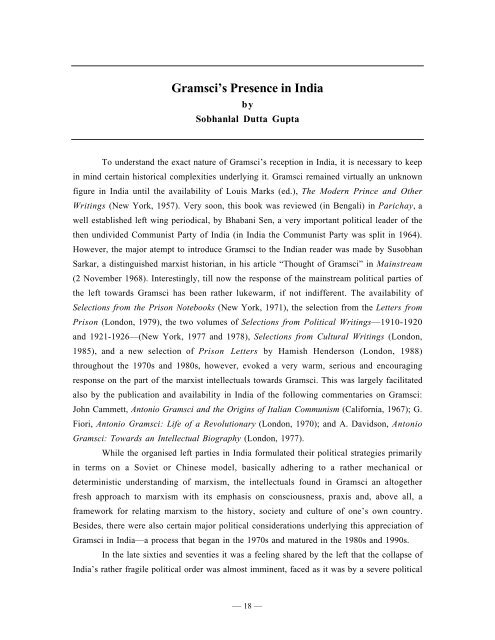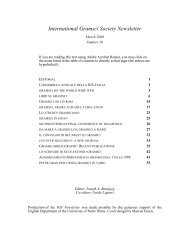Newsletter - International Gramsci Society
Newsletter - International Gramsci Society
Newsletter - International Gramsci Society
Create successful ePaper yourself
Turn your PDF publications into a flip-book with our unique Google optimized e-Paper software.
<strong>Gramsci</strong>’s Presence in India<br />
by<br />
Sobhanlal Dutta Gupta<br />
To understand the exact nature of <strong>Gramsci</strong>’s reception in India, it is necessary to keep<br />
in mind certain historical complexities underlying it. <strong>Gramsci</strong> remained virtually an unknown<br />
figure in India until the availability of Louis Marks (ed.), The Modern Prince and Other<br />
Writings (New York, 1957). Very soon, this book was reviewed (in Bengali) in Parichay, a<br />
well established left wing periodical, by Bhabani Sen, a very important political leader of the<br />
then undivided Communist Party of India (in India the Communist Party was split in 1964).<br />
However, the major atempt to introduce <strong>Gramsci</strong> to the Indian reader was made by Susobhan<br />
Sarkar, a distinguished marxist historian, in his article “Thought of <strong>Gramsci</strong>” in Mainstream<br />
(2 November 1968). Interestingly, till now the response of the mainstream political parties of<br />
the left towards <strong>Gramsci</strong> has been rather lukewarm, if not indifferent. The availability of<br />
Selections from the Prison Notebooks (New York, 1971), the selection from the Letters from<br />
Prison (London, 1979), the two volumes of Selections from Political Writings—1910-1920<br />
and 1921-1926—(New York, 1977 and 1978), Selections from Cultural Writings (London,<br />
1985), and a new selection of Prison Letters by Hamish Henderson (London, 1988)<br />
throughout the 1970s and 1980s, however, evoked a very warm, serious and encouraging<br />
response on the part of the marxist intellectuals towards <strong>Gramsci</strong>. This was largely facilitated<br />
also by the publication and availability in India of the following commentaries on <strong>Gramsci</strong>:<br />
John Cammett, Antonio <strong>Gramsci</strong> and the Origins of Italian Communism (California, 1967); G.<br />
Fiori, Antonio <strong>Gramsci</strong>: Life of a Revolutionary (London, 1970); and A. Davidson, Antonio<br />
<strong>Gramsci</strong>: Towards an Intellectual Biography (London, 1977).<br />
While the organised left parties in India formulated their political strategies primarily<br />
in terms on a Soviet or Chinese model, basically adhering to a rather mechanical or<br />
deterministic understanding of marxism, the intellectuals found in <strong>Gramsci</strong> an altogether<br />
fresh approach to marxism with its emphasis on consciousness, praxis and, above all, a<br />
framework for relating marxism to the history, society and culture of one’s own country.<br />
Besides, there were also certain major political considerations underlying this appreciation of<br />
<strong>Gramsci</strong> in India—a process that began in the 1970s and matured in the 1980s and 1990s.<br />
In the late sixties and seventies it was a feeling shared by the left that the collapse of<br />
India’s rather fragile political order was almost imminent, faced as it was by a severe political<br />
— 18 —



